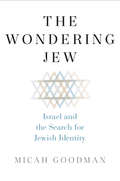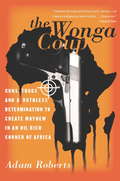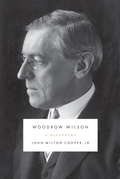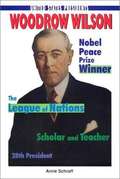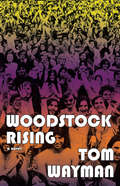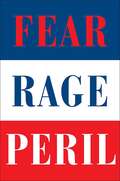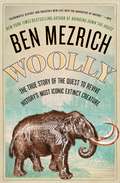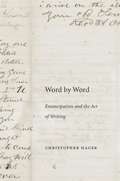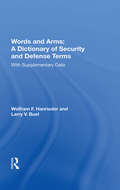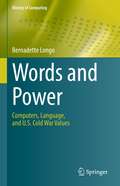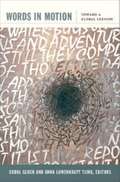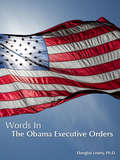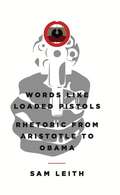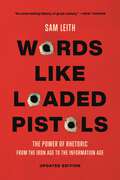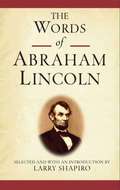- Table View
- List View
The Wondering Jew: Israel and the Search for Jewish Identity
by Micah GoodmanA celebrated Israeli author explores the roots of the divide between religion and secularism in Israel today, and offers a path to bridging the divide Zionism began as a movement full of contradictions, between a pull to the past and a desire to forge a new future. Israel has become a place of fragmentation, between those who sanctify religious tradition and those who wish to escape its grasp. Now, a new middle ground is emerging between religious and secular Jews who want to engage with their heritage—without being restricted by it or losing it completely. In this incisive book, acclaimed author Micah Goodman explores Israeli Judaism and the conflict between religion and secularism, one of the major causes of political polarization throughout the world. Revisiting traditional religious sources and seminal works of secularism, he reveals that each contains an openness to learn from the other’s messages. Goodman challenges both orthodoxies, proposing a new approach to bridge the divide between religion and secularism and pave a path toward healing a society torn asunder by extremism.
The Wonga Coup: Guns, Thugs, and a Ruthless Determination to Create Mayhem in an Oil-Rich Corner of Africa
by Adam RobertsEquatorial Guinea is a tiny country roughly the size of the state of Maryland. Humid, jungle covered, and rife with unpleasant diseases, natives call it Devil Island. Its president in 2004, Obiang Nguema, had been accused of cannibalism, belief in witchcraft, mass murder, billiondollar corruption, and general rule by terror. With so little to recommend it, why in March 2004 was Equatorial Guinea the target of a group of salty British, South African and Zimbabwean mercenaries, travelling on an American-registered ex-National Guard plane specially adapted for military purposes, that was originally flown to Africa by American pilots? The real motive lay deep below the ocean floor: oil. In The Dogs of War, Frederick Forsyth effectively described an attempt by mercenaries to overthrow the government of Equatorial Guinea - in 1972. And the chain of events surrounding the night of March 7, 2004, is a rare case of life imitating art-or, at least, life imitating a 1970s thriller-in almost uncanny detail. With a cast of characters worthy of a remake of Wild Geese and a plot as mazy as it was unlikely, The Wonga Coup is a tale of venality, overarching vanity and greed whose example speaks to the problems of the entire African continent.
Woodrow Wilson: A Psychological Study
by William BullittThis volume originated when William C. Bullitt began working on a book of studies of the principle personalities surrounding the Treaty of Versailles. In discussing this project with Sigmund Freud, the idea arose of a collaborative work on Woodrow Wilson. They worked on the book for ten years, reading all of Wilson's published books and speeches as well as volumes written about Wilson. After perusing this material, Bullitt and Freud realized that they could not write an analysis of Wilson's character unless they deepened their understanding of his nature with private, unpublished information from his intimates. They then set out to collect diaries, letters, records, and memoranda from various associates of Wilson.Freud writes in his introduction that he did not begin this study with an objective view of Wilson, but rather held an unsympathetic view of him. But he goes on to say that while reading through materials about Wilson, his strong emotions underwent a thorough subjugation. He describes Wilson as a person for whom mere facts held no significance; he esteemed highly nothing but human motives and opinions. As a result, writes Freud, it was natural for him in his thinking to ignore the facts of the real outer world, even to deny they existed if they conflicted with his hopes and wishes. This habit of thought is visible in his contacts with others. Freud also notes that there was an intimate connection between Wilson's alienation from the world of reality and his religious convictions.The book opens with a thirty-page biography of Wilson written by Bullitt. The collaborative psychological study that makes up the bulk of the volume then follows. Woodrow Wilson provides readers with a more intimate knowledge of the man, which in turn leads to a more exact estimate of his achievements. This intriguing psychoanalytic study will be of continuing interest to historians, political scientists, psychologists, and sociologists.
Woodrow Wilson: Twenty-eighth President of the United States
by David R. CollinsPresents a biography of the statesman who grew up in the South during the Civil War and served as President of Princeton University, Governor of New Jersey, and President of the United States during World War I.
Woodrow Wilson: A Biography
by John Milton Cooper Jr.In the first major biography of America's 28th president in nearly two decades, one of America's foremost presidential scholars gives readers a vigorous, lasting record of Wilson's life and achievements.
Woodrow Wilson and American Internationalism (Cambridge Studies in US Foreign Relations)
by Ambrosius Lloyd E.In this new work, one of the world's leading historians of US foreign relations, Lloyd E.Ambrosius, addresses enduring questions about American political culture and statecraft by focusing on President Woodrow Wilson and the United States in international relations during and after World War I. Updated to include recent historiography as well as an original introduction and conclusion, Woodrow Wilson and American Internationalism features nine different essays closely linked together by the themes of Wilson's understanding of Americanism, his diplomacy to create a new world order in the wake of World War I, and the legacy of his foreign policy. Examining the exclusive as well as universal dimensions of Wilsonianism, Ambrosius assesses not only Wilson's role during his presidency but also his legacy in defining America's place in world history. Speaking to the transnational turn in American history, Ambrosius shows how Wilson's liberal internationalist vision of a new world order would shape US foreign relations for the next century. Examines Woodrow Wilson's liberal internationalism during and after World War I. Shows how the scholarship on Woodrow Wilson and World War I fits in with historiographical trends since the end of the Cold War. Challenges the perspective of American exceptionalism as the framework for interpreting American and world history.
Woodrow Wilson and Harry Truman: Mission and Power in American Foreign Policy
by Anne PierceThe modern world derives part of its meaning and definition from the foreign policy formulations of Woodrow Wilson and Harry Truman. These presidents viewed the enhancement of American power and the invigoration of American principles as the only response to modem problems such as imperialism, bolshevism, fascism and "total war." The fact that Europe and Asia had submitted to the disastrous consequences of their ideas meant that we had to project and promote our democratic alternative. If we were to live up to our mission and our character, we had to accept radically new responsibilities. This work reveals the important relationship between these presidents and explores the reverential, yet revolutionary relationship each had with broader American traditions. Wilson came to power at a time when both need and the means for change were apparent. In the face of looming war and global turmoil, Wilson took full advantage of America's emerging world-power status. While he held to the traditional American ideal of setting a democratic example, he reconceived it as an obligation to actively promote democracy and self-determination abroad. Indeed, he construed our increased involvement in the world as the logical fulfillment of our democratic purpose. In the heated aftermath of World War II, Truman echoed Wilson's assertion that only the fortification of democracy and the "influence" of America could ease European tensions and prevent future wars. While Truman's early foreign policy is often said to exhibit Wilsonian internationalism, his later "power politics," Pierce shows that all of his foreign policy was underlain by his determination never to let what had happened during and between two world wars happen again. Pierce demonstrates that even Truman's most avid departure from Wilsonianism, his plunge into geopolitics and his build-up of the military power of the free world, was saturated with Wilsonian ideals. "Containment" was underlain by the conviction that, even though it faced fascism and bolshevism, freedom was on the march, and by the surety that democracy is lasting, peaceful and beneficial. As Pierce studies these presidents within the synergistic interplay of ideas and policies, she compels us toward a fruitful dialogue with the American past. Truman's brilliantly construed version of Wilsonianism, this book argues, holds great promise for us today.
Woodrow Wilson (United States Presidents Series)
by Anne SchraffWoodrow Wilson was president of the U.S. from 1912 to 1920. Although under his administration, the U.S. entered WW I, Wilson's great hope was for world peace. This biography covers his role as one of the founders of the League of Nations that was intended to bring an end to war, and Wilson's tragic failure to win ratification of the League of Nations from the U.S. Congress. A professor of law who published scholarly books, he served as president of Princeton University and Governor of New Jersey before his election to the presidency. His devotion to family life is portrayed, and the important political role of his second wife following his stroke is touched upon.
Woodstock Rising
by Tom WaymanIt’s late 1969 and Communist China has successfully launched its first satellite. Inspired by this feat, a group of college students in Laguna Beach, California, set out to put their own satellite into orbit in homage to the recent Woodstock Festival.A young Canadian graduate student at the University of California finds himself at the centre of the mayhem when he and his friends break into a mothballed missile silo and commandeer everything they need, including a nuclear warhead, to blast the Woodstock Nation into the space age. The activists have big plans for their loot, schemes that may well culminate in the Light Show to End All Light Shows in the Nevada desert.An extraordinary black comedy shot full of the social and political issues of the time, Woodstock Rising is a coming-of-age tale couched in free love, rock anthems, and revolution as well as a chronicle of an era whose causes continue to speak to us.
The Woodward Trilogy: Fear, Rage, and Peril
by Bob Woodward Robert CostaDiscover the inside story of life inside President Trump&’s White House as only #1 internationally bestselling author Bob Woodward can tell it with this collection of Woodward&’s most revealing and unprecedented works including Fear, Rage, and Peril.With authoritative reporting, internationally bestselling author Bob Woodward offers an exposing and riveting account of President Trump&’s term in office—from the beginning to the final transfer of power to President Biden&’s administration. In vivid detail, Woodward paints the most intimate portrait of a sitting president ever published in this complete trilogy following the Trump presidency. This collection includes: Fear: An &“explosive&” (The Washington Post) and &“devastating&” (The New Yorker) look at the harrowing life inside President Donald Trump&’s White House and precisely how he makes decisions on major foreign and domestic policies. Fear is the inside story on President Trump as only Bob Woodward can tell it, drawing from hundreds of hours of interviews with firsthand sources, meeting notes, personal diaries, files, and documents. Rage: An unprecedented and intimate tour de force of reporting on the Trump presidency facing a global pandemic, economic disaster, and racial unrest. In dramatic detail, Woodward has uncovered the precise moment the president was warned that the Covid-19 epidemic would be the biggest national security threat to his presidency. Peril: The book covers the end of the Trump presidency and the early months of the Biden presidency.
Woolly: The True Story of the Quest to Revive One of History's Most Iconic Extinct Creatures
by Ben MezrichScience fiction becomes reality in this Jurassic Park-like story of the genetic resurrection of an extinct species—the woolly mammoth—by the bestselling author of The Accidental Billionaires and The 37th Parallel.“With his knack for turning narrative nonfiction into stories worthy of the best thriller fiction” (Omnivoracious), Ben Mezrich takes us on an exhilarating true adventure story from the icy terrain of Siberia to the cutting-edge genetic labs of Harvard University. A group of young scientists, under the guidance of Dr. George Church, the most brilliant geneticist of our time, works to make fantasy reality by sequencing the DNA of a frozen woolly mammoth harvested from above the Arctic circle, and splicing elements of that sequence into the DNA of a modern elephant. Will they be able to turn the hybrid cells into a functional embryo and bring the extinct creatures to life in our modern world? Along with Church and his team of Harvard scientists, a world-famous conservationist and a genius Russian scientist plan to turn a tract of the Siberian tundra into Pleistocene Park, populating the permafrost with ancient herbivores as a hedge against an environmental ticking time bomb. More than a story of genetics, this is a thriller illuminating the race against global warming, the incredible power of modern technology, the brave fossil hunters who battle polar bears and extreme weather conditions, and the ethical quandary of cloning extinct animals. Can we right the wrongs of our ancestors who hunted the woolly mammoth to extinction—and at what cost?
Word by Word
by Christopher HagerOne of the cruelest abuses of slavery in America was that slaves were forbidden to read and write. Consigned to illiteracy, they left no records of their thoughts and feelings apart from the few exceptional narratives of Frederick Douglass and others who escaped to the North-or so we have long believed. But as Christopher Hager reveals, a few enslaved African Americans managed to become literate in spite of all prohibitions, and during the halting years of emancipation, thousands more seized the chance to learn. The letters and diaries of these novice writers, unpolished and hesitant yet rich with voice, show ordinary black men and women across the South using pen and paper to make sense of their experiences. Through an unprecedented gathering of these forgotten writings-from letters by individuals sold away from their families, to petitions from freedmen in the army to their new leaders, to a New Orleans man’s transcription of the Constitution-Word by Word rewrites the history of emancipation. The idiosyncrasies of these untutored authors, Hager argues, reveal the enormous difficulty of straddling the border between slave and free. These unusual texts, composed by people with a unique perspective on the written word, force us to rethink the relationship between literacy and freedom. For African Americans at the end of slavery, learning to write could be liberating and empowering, but putting their hard-won skill to use often proved arduous and daunting-a portent of the tenuousness of the freedom to come.
Word Plays: Collected Writings on Politics and Culture
by Robert BrusteinAccording to Robert Brustein, the theater should be taken seriously as one of the fine arts, but it should also be considered a means to reflect on our world, times, and culture from a different perspective. However, this presents a great challenge—the masses must come to appreciate the theater as a means of leisure, but also one of learning. If Word Plays tickles your funny bone as well as touches your mind, then Brustein will have achieved his goal. Word Plays, a collection of Brustein’s articles, satires, and skits, is his attempt to both entertain and educate about the current political and cultural environment in America. Openly positioning himself as a left-leaning political observer, Brustein’s material is wide-ranging and witty. His provocative views on contemporary politics and his ease with a broad range of subjects, from Shakespeare to The Sopranos, makes this an enjoyable, engaging, and reflective volume. The book is divided into three sections. The first is a set of short essays, many of which link political themes to the dramatic arts and others that are purely political commentary. The second includes a series of "dramatic commentaries"—short skits— lampooning contemporary politics and modern American life. The final section consists of "elegies and eulogies" honoring recently deceased icons of the American theater.
Words And Arms: With Supplementary Data
by Wolfram F HanriederThis comprehensive dictionary of terms frequently used in discussions of national security and defense policy contains approximately 800 entries on weapons systems, strategy concepts, military organization, and related items. Part 2 presents a more extensive treatment of such concepts as strategic force doctrine and deployment, Soviet and U.S. poli
Words and Power: Computers, Language, and U.S. Cold War Values (History of Computing)
by Bernadette LongoWhen viewed through a political lens, the act of defining terms in natural language arguably transforms knowledge into values. This unique volume explores how corporate, military, academic, and professional values shaped efforts to define computer terminology and establish an information engineering profession as a precursor to what would become computer science. As the Cold War heated up, U.S. federal agencies increasingly funded university researchers and labs to develop technologies, like the computer, that would ensure that the U.S. maintained economic prosperity and military dominance over the Soviet Union. At the same time, private corporations saw opportunities for partnering with university labs and military agencies to generate profits as they strengthened their business positions in civilian sectors. They needed a common vocabulary and principles of streamlined communication to underpin the technology development that would ensure national prosperity and military dominance. investigates how language standardization contributed to the professionalization of computer science as separate from mathematics, electrical engineering, and physicsexamines traditions of language standardization in earlier eras of rapid technology development around electricity and radiohighlights the importance of the analogy of “the computer is like a human” to early explanations of computer design and logictraces design and development of electronic computers within political and economic contextsforegrounds the importance of human relationships in decisions about computer designThis in-depth humanistic study argues for the importance of natural language in shaping what people come to think of as possible and impossible relationships between computers and humans. The work is a key reference in the history of technology and serves as a source textbook on the human-level history of computing. In addition, it addresses those with interests in sociolinguistic questions around technology studies, as well as technology development at the nexus of politics, business, and human relations.
Words Aptly Spoken: American Documents (Second Edition)
by Jennifer GreenholtAmerican Documents studies the history of American government through the lens of the documents that shaped her. The book opens with a chronological list of U.S. presidents and vice-presidents, with their portraits. There are seventeen speeches by famous statesmen such as Patrick Henry, George Washington, and Abraham Lincoln; poetry adds to the historical record with the accounts of Pocahontas by William Thackeray, Valley Forge by Thomas Read, the Battle of the Alamo by Joaquin Miller, and Panama by James Roche, to name a few. Essays include two of the Federalist Papers by founders Alexander Hamilton and James Madison; and finally, the legal documents that evolved the U.S. national government, boundaries, and rights of her citizens are reproduced. All forty-three selections include questions for review and further thought to aid Challenge I students, as well as illustrations and photographs culled from the U.S. Library of Congress to further enhance the historical record
Words from the White House: Words and Phrases Coined or Popularized by America's Presidents
by Paul Dickson"A compendious, entertaining look at our nation's leaders through words and turns of phrase." — Kirkus ReviewsFrom George Washington's "New Yorker" and Thomas Jefferson's "pedicure" to Theodore Roosevelt's "lunatic fringe," Richard Nixon's "silent majority," and Donald Trump's "covfefe," this entertaining and eminently readable volume compiles words and phrases that were coined or popularized by American presidents. Discover the origins of "bloviate" (Warren G. Harding), "military-industrial complex" (Dwight D. Eisenhower), "misunderestimate" (George W. Bush), "squatter" (James Madison), and other terms that have helped define American culture. The entries are listed alphabetically, featuring a definition and — in most cases — a brief discussion that places them in historical context."Thoroughly enjoyable." — The Washington Post"The author is an essayist and lexicographer who presents this entertaining look at how presidents have used and shaped our language." — The Dispatch (Columbus)
Words in Motion: Toward a Global Lexicon
by Carol Gluck Anna Lowenhaupt TsingOn the premise that words have the power to make worlds, each essay in this book follows a word as it travels around the globe and across time. Scholars from five disciplines address thirteen societies to highlight the social and political life of words in Asia, Europe, and the Middle East, from the mid-nineteenth century to the present. The approach is consciously experimental, in that rigorously tracking specific words in specific settings frequently leads in unexpected directions and alters conventional depictions of global modernity. Such words as security in Brazil, responsibility in Japan, community in Thailand, and hijāb in France changed the societies in which they moved even as the words were changed by them. Some words threatened to launch wars, as injury did in imperial Britain's relations with China in the nineteenth century. Others, such as secularism, worked in silence to agitate for political change in twentieth-century Morocco. Words imposed or imported from abroad could be transformed by those who wielded them to oppose the very powers that first introduced them, as happened in Turkey, Indonesia, and the Philippines. Taken together, this selection of fourteen essays reveals commonality as well as distinctiveness across modern societies, making the world look different from the interdisciplinary and transnational perspective of "words in motion. " Contributors. Mona Abaza, Itty Abraham, Partha Chatterjee, Carol Gluck, Huri Islamoglu, Claudia Koonz, Lydia H. Liu, Driss Maghraoui, Vicente L. Rafael, Craig J. Reynolds, Seteney Shami, Alan Tansman, Kasian Tejapira, Anna Lowenhaupt Tsing
Words in the Obama Executive Orders
by Douglas LowryContents include the full text of President Obama's executive orders January 2009 through August 2012, the Declaration of Independence, the Constitution of the United States, plus an introduction and links to cloud-based search and research tools. These tools equip the reader to learn about presidential orders and to arrive at personal judgments about the health of the intended balance of power among the executive, congress, and judiciary of the United States. The introduction invites the reader to substitute a "power / service" dimension for the "left / right" way of thinking that corrodes our ability to collaborate in this nation's political life.
Words Like Colored Glass: The Role Of The Press In Taiwan's Democratization Process
by Daniel K BermanA study of the contribution of the Press to the democratization process in Taiwan. Combining ideas from political science, communication theory and Chinese studies, the author challenges conventional wisdom on the subject.
Words Like Loaded Pistols
by Sam LeithRhetoric is all around us. It's what inspires armies, convicts criminals, and makes or breaks presidential candidates. And it isn't just the preserve of politicians. It's in the presentation to a key client, the half-time talk in the locker room, and the plea to your children to eat their vegetables. Rhetoric gives words power: it persuades and cajoles, inspires and bamboozles, thrills and misdirects. You have been using rhetoric yourself, all your life. After all, you know what a rhetorical question is, don't you?In Words Like Loaded Pistols, Sam Leith traces the art of persuasion, beginning in ancient Syracuse and taking us on detours as varied and fascinating as Elizabethan England, Milton's Satanic realm, the Springfield of Abraham Lincoln and the Springfield of Homer Simpson. He explains how language has been used by the great heroes of rhetoric (such as Cicero and Martin Luther King Jr.), as well as some villains (like Adolf Hitler and Richard Nixon.)Leith provides a primer to rhetoric's key techniques. In Words Like Loaded Pistols, you'll find out how to build your own memory-palace; you'll be introduced to the Three Musketeers: Ethos, Pathos and Logos; and you'll learn how to use chiasmus with confidence and occultation without thinking about it. Most importantly of all, you will discover that rhetoric is useful, relevant - and absolutely nothing to be afraid of.
Words Like Loaded Pistols: Rhetoric from Aristotle to Obama
by Sam LeithIn Words Like Loaded Pistols, Sam Leith traces the art of persuasion, beginning in ancient Syracuse and taking us on detours as varied and fascinating as Elizabethan England, Milton's Satanic realm, the Springfield of Abraham Lincoln and the Springfield of Homer Simpson. He explains how language has been used by the great heroes of rhetoric (such as Cicero and Martin Luther King Jr.), as well as some villains (like Adolf Hitler and Richard Nixon.) Words Like Loaded Pistols is a primer to rhetoric's key techniques; you'll find out how to build your own memory-palace; you'll be introduced to the Three Musketeers: Ethos, Pathos and Logos; and you'll learn how to use chiasmus with confidence and occultation without thinking about it. Most importantly of all, you will discover that rhetoric is useful, relevant - and absolutely nothing to be afraid of.
Words Like Loaded Pistols
by Sam LeithLeith, a British journalist and writer, offers a no-nonsense introduction to rhetoric for an intelligent, but non-academic audience. He uses both historical and contemporary, real and literary examples to present where western rhetoric comes from and how it has been taught/used over the ages; what the terms of rhetoric are; why different arguments work the way they do and why some arguments work while others don't. The aim of the book is to instill a practical awareness for rhetoric. He considers five parts of rhetoric--invention, arrangement, style, memory, and delivery--as well as three branches of oratory--deliberative, judicial, and epideictic rhetoric. Along the way he draws on great speeches and "champions of rhetoric," from Martin Luther King to Satan to Barack Obama to Hitler to Cicero. There is a glossary of rhetorical terms in the back. Annotation ©2012 Book News, Inc. , Portland, OR (booknews. com)
Words Like Loaded Pistols
by Sam LeithRhetoric is all around us. It's what inspires armies, convicts criminals, and makes or breaks presidential candidates. And it isn't just the preserve of politicians. It's in the presentation to a key client, the half-time talk in the locker room, and the plea to your children to eat their vegetables. Rhetoric gives words power: it persuades and cajoles, inspires and bamboozles, thrills and misdirects. You have been using rhetoric yourself, all your life. After all, you know what a rhetorical question is, don't you?In Words Like Loaded Pistols, Sam Leith traces the art of persuasion, beginning in ancient Syracuse and taking us on detours as varied and fascinating as Elizabethan England, Milton's Satanic realm, the Springfield of Abraham Lincoln and the Springfield of Homer Simpson. He explains how language has been used by the great heroes of rhetoric (such as Cicero and Martin Luther King Jr.), as well as some villains (like Adolf Hitler and Richard Nixon.)Leith provides a primer to rhetoric's key techniques. In Words Like Loaded Pistols, you'll find out how to build your own memory-palace; you'll be introduced to the Three Musketeers: Ethos, Pathos and Logos; and you'll learn how to use chiasmus with confidence and occultation without thinking about it. Most importantly of all, you will discover that rhetoric is useful, relevant - and absolutely nothing to be afraid of.
The Words of Abraham Lincoln
by Abraham LincolnFrom the "Four score and seven years ago" that every American schoolchild knows to personal notes and dozens of memorable letters, debates, and speeches from a critical time in this nation's history, here is a remarkable collection of Lincoln's writings. Through them, we can follow the sixteenth president's development from country lawyer to healer of a wounded nation. Arranged thematically, The Words of Abraham Lincoln brings together his early writings, his notes on courtship, marriage, and the family, his thoughts on slavery, including the full text of the Emancipation Proclamation, and his letters to his generals during the Civil War, among other subjects. This book includes eight historical photographs and a chronology. Two hundred years after his birth, Lincoln's writing endures. Witty and wise, Lincoln speaks today as powerfully as he did when he was president.
